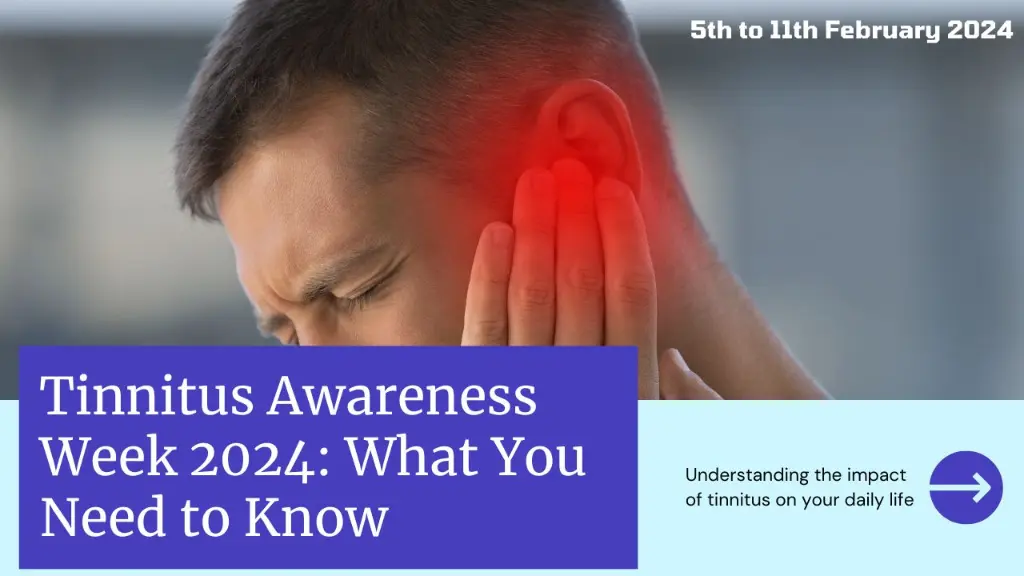Discover the importance of Tinnitus Awareness Week 2024, an annual event dedicated to shedding light on the often misunderstood condition of tinnitus. Learn about its impact, causes, and how you can join the movement to raise awareness and support those affected.
1. Introduction of Tinnitus Awareness Week 2024:
Imagine you are sitting in a quiet room, but you can’t escape the sound of a constant ringing, buzzing, or whooshing in your ears. That’s the reality for millions of people worldwide who live with tinnitus, a phantom noise that can be incredibly disruptive and frustrating.
This February, during the first full week (5th-11th), we celebrate Tinnitus Awareness Week. It’s a time to shine a light on this often misunderstood condition, raise awareness of its impact, and share tips for preventing and managing tinnitus.
2. What is Tinnitus:
Tinnitus is the term for the sensation of hearing a sound in the absence of any external sound.
In a simple way we can say that Tinnitus is when you hear sounds in your ears, like ringing or buzzing, but actually there is no sound around you. It’s kind of like hearing a phantom or ghost sound which does not exist in reality.
You might hear different types of sound, for example ringing, buzzing, whooshing or humming. These can be continuous or they can come and go.
The tinnitus might seem like it’s in one ear or both, in the middle of the head or even be difficult to pinpoint. Some people may think the noise is coming from outside and hunt for it until they discover it’s actually inside them!
It is also hard to convince people of it, as the sounds are generally subjective to just the person who is suffering and the only one who can hear it.
3. What are the symptoms of tinnitus?
3.1 Primary Symptoms:
The primary symptom of tinnitus is the perception of sounds in the ears or head that have no external source. These sounds can be described in many different ways, including:
- Ringing: This is the most common description of tinnitus, often resembling a high-pitched bell or cicada sound.
- Buzzing: A more low-pitched humming or droning sound is also frequently reported.
- Hissing: Similar to escaping air or steam, this sound can be high-pitched and persistent.
- Clicking or ticking: Repetitive rhythmic sounds like clicking, clock ticking, or even pulsing with your heartbeat can occur.
- Roaring or whooshing: This can sound like ocean waves or strong wind, creating a constant background noise.
- Musical sounds: A less common symptom, but some people hear melodies or specific musical notes in their tinnitus.
3.2 Other Symptoms:
- Varying volume and pitch: The sounds can fluctuate in intensity and tone, sometimes becoming more noticeable in quiet environments.
- Location: Tinnitus can be perceived in one or both ears, sometimes even feeling like it’s coming from inside your head.
- Intermittent or constant: In some cases, the sounds come and go, while for others, they are present continuously.
- Impact on concentration and sleep: The constant internal noise can make it difficult to focus, relax, and fall asleep.
- Anxiety and depression: The chronic nature of tinnitus and its impact on daily life can lead to emotional distress.
- Hearing difficulties: Tinnitus can sometimes coexist with or worsen existing hearing loss, making it harder to hear external sounds.
4. What causes Tinnitus?
Unfortunately, the exact cause of tinnitus is often unknown. While there are many factors that can contribute to its development, it’s rarely a single, definitive cause. However, researchers have identified several key contributors:
- Noise Exposure: Researchers believe that this is the most common factor. Prolonged exposure to loud noises, such as those in industrial workplaces, concerts, or through personal audio devices, can damage the delicate hair cells in the inner ear, leading to tinnitus.
- Ear infections and blockages: These can disrupt the normal transmission of sound waves in the ear, causing temporary tinnitus that usually resolves once the infection or blockage is cleared.
- Medications: Some medications, particularly those that are ototoxic (toxic to the ear), can cause or exacerbate tinnitus as a side effect.
- Age-related hearing loss: As we age, the hair cells in the inner ear naturally deteriorate, which can contribute to both tinnitus and hearing loss.
- Medical conditions: Several medical conditions, such as Meniere’s disease, temporomandibular joint (TMJ) disorders, and head and neck trauma, can also cause tinnitus.
- Psychological factors: Stress, anxiety, and depression can all exacerbate tinnitus symptoms, though they may not be the primary cause.
Note: It’s important to note that tinnitus can result from a combination of factors, and the exact cause may not always be identifiable. Seeking evaluation by a healthcare professional, such as an audiologist or otolaryngologist (ENT specialist), can help determine the underlying cause of tinnitus and guide appropriate management and treatment strategies.
5. How can Tinnitus Affect Individuals?
Tinnitus can affect individuals in various ways, both physically and emotionally. Here are some common effects:
- Physical Effects:
- Mental and Emotional Effects:
- Social and Occupational Effects:
5.1 Physical Effects:
- Hearing difficulties: Tinnitus can mask external sounds, making it harder to hear speech and background noise, leading to communication issues and social isolation.
- Sleep disturbances: The constant phantom sounds can disrupt sleep patterns, causing fatigue, difficulty concentrating, and irritability.
- Headaches and dizziness: Some people with tinnitus experience headaches, dizziness, and balance problems, which can further impact their daily activities.
5.2 Mental and Emotional Effects:
- Anxiety and depression: The constant presence of tinnitus can be a source of anxiety and stress, leading to depression and other mental health issues.
- Frustration and anger: The inability to control the phantom sounds can be frustrating and lead to anger outbursts.
- Hyperacusis: Some people with tinnitus become hypersensitive to certain sounds, making everyday activities like listening to music or being in crowded places overwhelming.
5.3 Social and Occupational Effects:
- Social isolation: The fear of others hearing the tinnitus or the difficulty in communication can lead to social withdrawal and isolation.
- Work performance: Difficulty concentrating and sleep disturbances can affect job performance and productivity.
- Relationships: Tinnitus can strain relationships with family and friends due to irritability, mood swings, and reduced communication.
6. Why to Celebrate Tinnitus Awareness Week?
- Raise awareness: Many people don’t know about tinnitus or its impact. By talking about it openly, we can break the stigma and encourage people to seek help.
- Promote Research: We still don’t have a cure for tinnitus, but research is ongoing. This week highlights the need for more funding and development of effective treatments.
- Support those affected: Millions live with tinnitus every day. Sharing information and resources can empower them to manage the condition and improve their well-being.
6.1 Less Known Facts and Statistics:
- Tinnitus affects around 15-20% of the population, making it more common than you might think.
- Veterans or old people are particularly vulnerable due to noise exposure during their service.
- Tinnitus can be a symptom of other medical conditions, like ear infections or head injuries.
6.2 Taking Action: Protecting Your Ears at Work and Home:
- Know your noise exposure: Use noise monitoring devices at work and be mindful of personal noise levels.
- Protect your ears: Use earplugs or earmuffs in noisy environments.
- Give your ears breaks: Take regular quiet time to allow your ears to recover.
- Manage stress: Stress can worsen tinnitus symptoms. Practice relaxation techniques like yoga or meditation.
7. Myths of Tinnitus:
- Myth: Tinnitus is always a sign of deafness.
- Fact: While tinnitus is often associated with hearing loss, it doesn’t automatically mean you’re deaf. Many people with tinnitus have normal hearing or only mild hearing loss.
- Myth: Tinnitus is a harmless condition.
- Fact: While tinnitus can be mild and manageable, it can also be debilitating for some, leading to sleep disturbances, anxiety, and depression.
- Myth: There’s no cure for tinnitus.
- Fact: While there’s no permanent cure, various treatments and management strategies can significantly improve symptoms and quality of life.
- Myth: You should ignore tinnitus and it will go away on its own.
- Fact: Seeking professional help early on is crucial for proper diagnosis, identifying underlying causes, and implementing effective treatment options.
- Myth: Only older people get tinnitus.
- Fact: Tinnitus can affect people of all ages, including children and young adults.
8. FAQs for Tinnitus Awareness Week:
Q1: What is Tinnitus Awareness Week?
Ans1: Tinnitus Awareness Week is an annual international event aimed at raising awareness about tinnitus, its causes, impact, and available treatment options. This year, it is observed from February 5th to 11th, 2024.
Q2: What are the different types of tinnitus?
Ans2: Tinnitus can vary in sound perception, including ringing, buzzing, hissing, clicking, and even musical sounds. It can be subjective (only heard by the individual) or objective (heard by others too).
Q3: What causes tinnitus?
Ans3: Multiple factors can contribute to tinnitus, including noise-induced hearing loss, ear infections, certain medications, head or neck injuries, and age-related hearing loss.
Q4: How is tinnitus diagnosed?
Ans4: Diagnosis involves a medical history review, ear examination, hearing tests, and sometimes imaging studies.
Q5: Is there a cure for tinnitus?
Ans5: Currently, no definitive cure exists. However, various treatment options like sound therapy, tinnitus retraining therapy, cognitive-behavioral therapy, and sometimes medications can effectively manage symptoms and improve quality of life.
Q6: How can I live with tinnitus?
Ans 6: Management strategies include reducing noise exposure, managing stress, practicing relaxation techniques, using sound masking devices, and seeking support groups or counseling.
Q7: Who can I contact for help with tinnitus?
Ans7: Consult your doctor or an audiologist for diagnosis and treatment options. Tinnitus organizations and support groups can offer valuable information and peer support.
Q8: What can I do to support Tinnitus Awareness Week?
Ans8: Share information about tinnitus on social media, participate in awareness events, donate to research organizations, and encourage others to get help if they experience tinnitus symptoms.
By dispelling myths and raising awareness, we can encourage early diagnosis, effective treatment, and improved quality of life for individuals living with tinnitus.
Disclaimer: This blog is for general information only and is not a substitute for professional medical advice. If you experience tinnitus, consult a doctor or audiologist for proper diagnosis and management.
For future updates, suggestion and discussion, please connect with us on Facebook, Twitter & Linkedin.
Click the link to read more topics on 2024 Calendar and Important Days for HSE Professionals.






